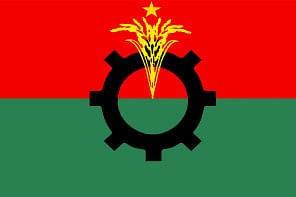Bangladesh govt tells Nixon not to contribute to genocide

June 24, 1971
NAZRUL'S TELEGRAM TO NIXON
Acting president of the Government of Bangladesh Syed Nazrul Islam strongly deprecated renewed US arms supply to Pakistan. In a telegram to US President Richard Nixon, Nazrul said the government and people of Bangladesh were most hurt and distressed to learn about the arms supply.
He pointed out that Pakistan was using all the weapons in its armoury including boats suppled for relief purposes to commit genocide and said, "As an independent and sovereign nation now, we appeal to conscience and even national interest of United States not to contribute to genocide and mass eviction of people and destruction of scarce resource of an impoverished nation."
A foreign office spokesman of the Bangladesh government described the renewed sale as a "stern blow to the bleeding people of Bangladesh" and declared that the Liberation War would be carried on relentlessly whatever be the aid to Pakistan.
GRAIN SHORTAGE EXPECTED TO HIT EAST PAKISTAN
An impending crisis in grain distribution was expected to grip East Pakistan soon, further sapping the health and resistance of much of the war-torn nation's population.
Experts on food aid in Dhaka and visiting teams of specialists said the shortages, expected to begin appearing in the next three months, would claim most of their victims from among poor rural people.
The shortages would affect even those parts of the country normally considered food-surplus areas, the experts agreed.
The huge problem facing the government and the foreign relief aid teams was partly one of shipping in enough grain. The two ports, Chittagong and Khulna, had a limited capacity. In normal times their best processing rate had been 1,70,000 tonnes of aid food grains a month. Some experts believed that even if the ports, now hit by labour shortages and storage problems, could reach this top capacity, it might not be enough.
But the crux of the problem was the distribution of the grain. Officials were less worried about physical damage to the communications network or shortages of ships, boats and road vehicles than they are about the capacity of the administrative machinery.
MEMORANDUM TO PRESIDENT NIXON
The US President's Deputy Special Assistant for National Security Affairs Alexander Haig sent a memorandum to President Nixon on military supply for Pakistan and recommended to suspend all shipments temporarily while the government reviews items still in the pipeline.
The purpose, said Haig, would be to screen out those items which could have military significance in East Pakistan. This might result in a decision to release some innocuous spare parts while withholding ammunition.
The advantage of this approach, according to the memorandum, would be that it would tighten control and permit the US government to be selective in what goes without imposing an embargo.
PAKISTAN CLAIMS CONTACT WITH MUSHTAQUE
An Associated Press report from Dhaka quoted "informed Pakistani government sources" as saying that "Martial Law authorities have been in contact with Khondaker Mushtaque Ahmed, Vice President of Bangladesh Awami League and the officially designated foreign minister of secessionist Bangladesh government".
Sources close to the exiled Bangladesh government described as a blatant lie the statement reportedly made by the Martial Law authorities in Dhaka. There had been absolutely no contact, the sources said.
Shamsuddoza Sajen is a journalist and researcher. He can be contacted at [email protected]

 For all latest news, follow The Daily Star's Google News channel.
For all latest news, follow The Daily Star's Google News channel. 



Comments